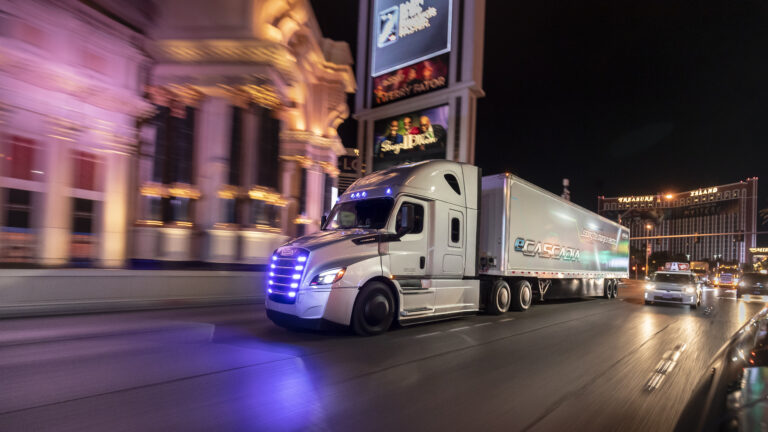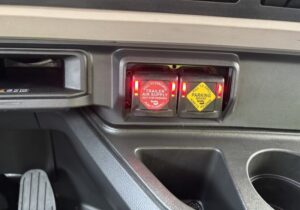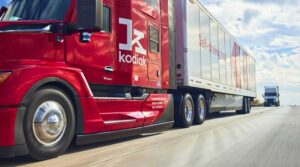STUTTGART and BERLIN, Germany — Daimler Trucks and Buses said Friday it was pursuing a sustainable corporate strategy that aims to offer only new vehicles that are CO2-neutral in driving operation (“tank-to-wheel”) in the triad markets of Europe, Japan and NAFTA countries by 2039.
Already by 2022, the company said it plans to include series-produced vehicles with battery-electric drive in its vehicle portfolio in its main sales regions Europe, the United States and Japan.
By the end of the next decade, Daimler Trucks and Buses said it will will extend its range of vehicles with hydrogen-powered series production vehicles.
Just this week Daimler Trucks and Buses said it celebrated the world premiere of the FUSO brand fuel-cell prototype “Vision F-Cell” at the Tokyo Motor Show in Japan, thus further strengthening its activity in the hydrogen field. In addition, all European Daimler Trucks & Buses plants will be CO2-neutral by the year 2022. All other plants will follow.

“At Daimler Trucks and Buses we are clearly committed to the goals of the Paris Climate Protection Agreement and thus to the decarbonization of our industry. Having CO2-neutral transport on the road by 2050 is our ultimate goal,” said Martin Daum, member of the Board of Management of Daimler AG, responsible for Trucks and Buses, during his keynote address Friday at the International Supply Chain Conference in Berlin.” This can only be achieved if competitive conditions for CO2-neutral transport are created for our customers in terms of costs and infrastructure. As it takes about ten years to completely renew a fleet until 2050, our ambition is to offer ‘tank-to-wheel’ locally CO2-neutral new vehicles in the triad by the year 2039. Truly CO2-neutral transport only works with battery-electric or hydrogen-based drive. We were the first manufacturer to seriously commit to electromobility in heavy trucks and, today, are pioneers and in all segments with electric vehicles in customer use. With our holistic approach to e-mobility in the bus sector, which consists of an electric city bus and consulting, we are already making a significant contribution to the locally emission-free public transport of the future and air pollution control in urban areas.”
Daum said locally CO2-neutral trucks and buses won’t sell themselves, because even in 2040 — despite all efforts by manufacturers — the acquisition and total cost of ownership of trucks and buses with electric drives will be still higher than for diesel vehicles.
“We therefore need government incentives to make locally CO2-neutral trucks and buses competitive,” Daum said. “Particularly necessary: converting and staggering tolls Europe-wide based on CO2 values whereby CO2-neutral vehicles would get significant relief, a targeted subsidy program for buses and for a nationwide charging and hydrogen infrastructure as well as uniform standards for the transport and refueling of hydrogen.”
Daum said Daimler Trucks has been gaining experience with electric trucks since 2010 and since 2017 has had its first small series-produced all-electric truck on the market and in customers’ hands: the Fuso eCanter light-duty truck.
More than 140 eCanter are already in customer service in cities worldwide, including New York City, Tokyo, Berlin, London, Amsterdam, Paris and Lisbon. The Mercedes-Benz eActros heavy-duty truck, with a range of up to 200 km, is in intensive use by customers in Germany and Switzerland as part of the eActros “innovation fleet”. The first hand-off to a customer was in 2018. In the United States, the medium-duty Freightliner eM2 and the heavy-duty Freightliner eCascadia are also undergoing intensive field tests with customers.
Daum said Daimler has been working on drive technologies based on hydrogen for more than 30 years.
“To date the company’s fuel cell vehicles have traveled many millions of kilometers, demonstrating the marketability of this drive concept,” he said. “Still, there are very specific challenges in the commercial vehicle sector, such as service life and payload availability. Battery-electric and hydrogen-drive technologies offer different benefits depending on the purpose and therefore complement each other. The decisive criterion for truck and bus customers is the total cost of ownership.”
The Trucker News Staff produces engaging content for not only TheTrucker.com, but also The Trucker Newspaper, which has been serving the trucking industry for more than 30 years. With a focus on drivers, the Trucker News Staff aims to provide relevant, objective content pertaining to the trucking segment of the transportation industry. The Trucker News Staff is based in Little Rock, Arkansas.















